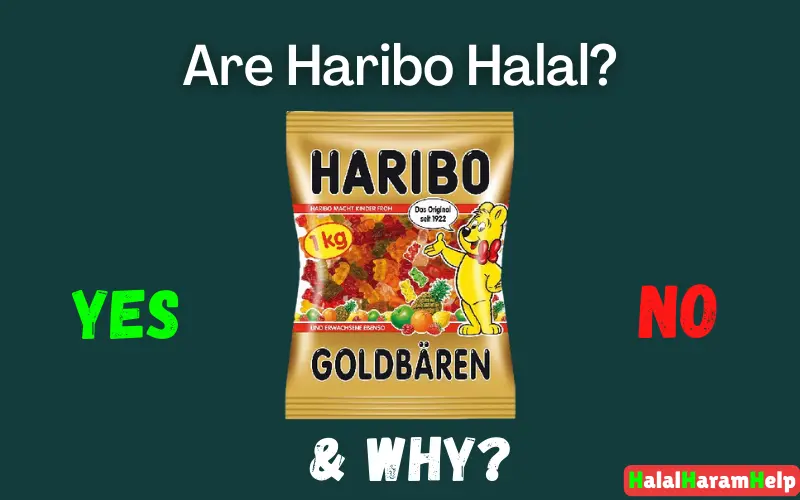Are Haribo halal? This question has sparked curiosity among many candy enthusiasts who follow dietary restrictions.
As one of the most beloved gummy brands worldwide, Haribo’s colorful treats are a staple in sweet shops and supermarkets.
However, for those adhering to halal dietary laws, the ingredients and production processes of these popular candies come under scrutiny.
Therefore, in this article, we’ll explore the halal status of Haribo products, diving into the specifics of their ingredients, manufacturing practices, and certifications.
Whether you’re a devoted Haribo fan or simply seeking clarity, join us as we uncover the truth behind the chewable delights of Haribo.

Are Haribo Halal?
Yes and no. Most Haribo products are not halal but there are exceptions based on the country of manufacture.
Haribo, a well-known gummy candy brand, has different production standards depending on the location.
In the UK and the USA, Haribo products typically contain pork gelatin, which is not permissible under halal dietary laws. Therefore, in these regions, Haribo candies are generally considered haram (not halal).
On the other hand, Haribo products manufactured in Turkey use cow or bull gelatin and have halal certification.
These Turkey-made Haribo candies adhere to the halal guidelines, making them suitable for those following a halal diet.
If you come across Haribo products in other countries that are explicitly labeled as made in Turkey, and halal certified you can consider them halal.
It’s important to always check the packaging for the country of origin and any halal certification marks to ensure that the Haribo candies you are purchasing meet your dietary requirements.
You might also like to know are Lays halal.
Ingredients To Watch Out For
When determining whether a product is halal, it’s essential to inspect the ingredients. For gummy candies like Haribo, gelatin is the primary concern.
Gelatin is derived from animal collagen, and its source determines its halal status. Pork gelatin is haram, while gelatin from cows or bulls can be halal if the animals were slaughtered according to Islamic law.
Therefore, Haribo products containing pork gelatin, which are common in the UK and the USA, are not halal.
WhyTurkey Made Haribo Halal?
Turkey-made Haribo products are a notable exception in the Haribo lineup.
These candies use gelatin derived from cows or bulls that are slaughtered according to halal standards.
As a result, they are certified halal and suitable for consumption by those following a halal diet.
These products are sometimes available in other countries, so it’s worth looking for the “Made in Turkey” label and halal certification when purchasing Haribo candies.
How to Identify Halal Haribo Products?
Identifying halal Haribo products requires careful examination of the packaging. Look for the country of origin, which should be Turkey for halal products.
Additionally, check for a halal certification mark, usually found near the ingredient list or on the front of the package.
This certification ensures that the product has been verified by a credible halal certification body and meets all necessary dietary guidelines.
Also learn are Sun Chips halal.
FAQs
Q1: Is Haribo ok for Muslims?
A: Most Haribo products are not halal and are therefore not suitable for Muslims. However, Haribo candies made in Turkey are halal-certified and can be consumed by Muslims.
Q2: Does Haribo still use pork gelatin?
A: Yes, Haribo products made in the UK and the USA typically contain pork gelatin.
Q3: Which Haribo gummy bears are halal?
A: Haribo gummy bears made in Turkey are halal, as they use halal-certified cow or bull gelatin.
Also see is Pringles halal.
Conclusion
In conclusion, while Haribo candies are a favorite among many, their halal status varies significantly depending on where they are produced.
Most Haribo products in the UK and the USA are not halal due to the use of pork gelatin.
However, Haribo candies made in Turkey use halal-certified cow or bull gelatin, making them suitable for those following a halal diet.
Hence, always check the packaging for the country of origin and halal certification to ensure the product meets your dietary needs.


